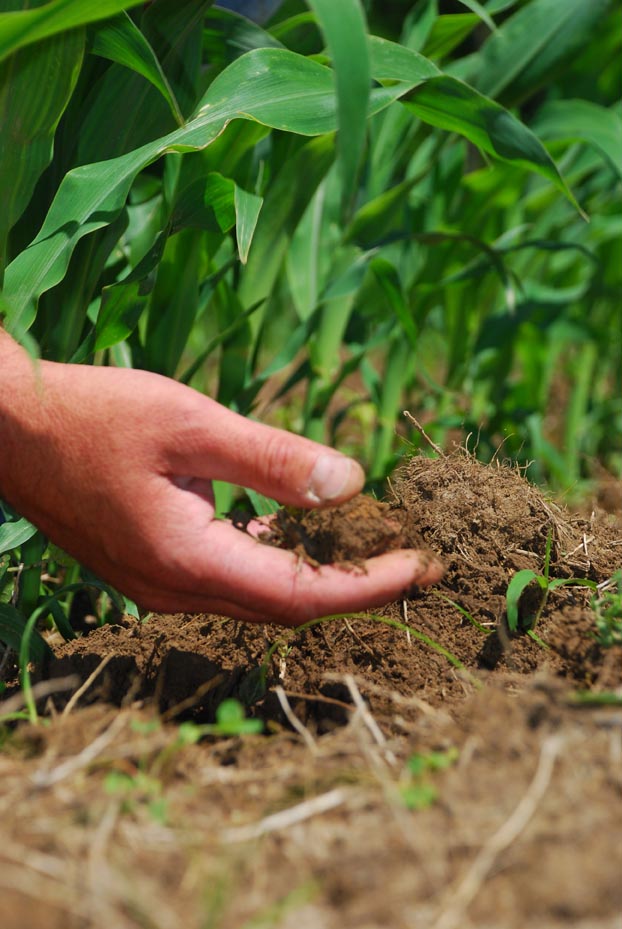March 12, 2018

Source: Soil Health Partnership
The seeds of good data have been planted—and the Soil Health Partnership is eager to harvest early results.
The organization’s team is currently preparing for another round of robust soil sampling, a critical part of identifying, testing and measuring farm management practices that improve sustainability through soil health. An initiative of the National Corn Growers Association, the program’s goal is to quantify the benefits of these practices–like growing cover crops in the off-season and reducing tillage—from an economic standpoint, showing farmers how healthy soil benefits their bottom line.
“We have spent the first few years carefully constructing the infrastructure within our program to make sure that we have scientifically credible data,” said Nick Goeser, NCGA Vice President of Production and Sustainability. “We are now beginning to make early sense of the scope and scale of the dataset collected over last 3 and a half years – and we are eagerly anticipating the next 7-plus years of data collection.”
Research of this type, size and scope on working farms is unique. Goeser noted that the farmer data in the program are closely guarded and used only in the farmer’s best interest. SHP data are not released to anyone – not even the founding partners in the program – without each farmer’s written consent.
Looking beyond routine soil tests, SHP has collected a database of more than 1,200 samples to look at physical and biological soil health indicators across enrolled farmers. When including stratified sampling for routine analyses, the number jumps to almost 17.5 thousand samples—making it one of the biggest databases of soil health sample information from working, commercial scale farms in the country, Goeser said. The SHP collects over 165 measurements on things like soil type, aerial imagery, yield, and management practices.
Based on the data, SHP has had a glimpse of very preliminary results on one important soil health indicator—aggregate stability. This refers to the ability of soil to resist breaking down in the face of disruptive forces like rain or wind.
“Many factors influence crop yields – and an early look shows as much as a 10-to-20 percent yield variability across the ranges of aggregate stability, depending on soil type,” Goeser said. “The current assumption is that aggregate stability is improved by reduced tillage and cover crops – we will continue testing this to see where this holds true.”
This research provides an opportunity to demonstrate whether poor aggregate stability is a limiting factor in production, Goeser added.
SHP is also looking at economics of practice shifts like adding cover crops, changes in tillage or adjustments to nutrient management. Early results are promising across the partnership with many individual farm examples of increased profitability through proper adoption of cover crops.
The SHP is also tracking how long it takes to improve soil health indicators like aggregate stability, water holding capacity, and nutrient content.
What makes SHP stand out from other conservation cropping system programs is that SHP strives to enroll typical farmers to gain realistic and practical perspectives about agricultural systems and the capacity to change. About 75 percent of the SHP farms are in a typical corn and soybean rotation. About 37 percent of the farmers practice no-till, 20 percent implement full-width conventional tillage, with a remaining 43 percent practicing reduced tillage, or a combination of reduced and no-till.
“We know that every soil type responds differently to erosion or tillage, weed management, nutrient application, and other agronomic practices. Over time, the data will bear out those effects more fully,” Goeser said. “That’s when we’ll really have a field day digging into the data.”
About the Soil Health Partnership
The Soil Health Partnership is a farmer-led initiative that fosters transformation in agriculture through improved soil health, benefiting both farmer profitability and the environment. With more than 100 working farms enrolled in 12 states, the SHP tests, measures and advances progressive farm management practices that will enhance sustainability and farm economics for generations to come. SHP brings together diverse partners to work towards common goals. At least a ten-year scientific program administered by the National Corn Growers Association, the SHP’s vision is driven by initial and continuing funding and guidance from NCGA, Monsanto, the Walton Family Foundation, the Midwest Row Crop Collaborative, General Mills, the Foundation for Food and Agriculture Research and USDA, with technical support from The Nature Conservancy and the Environmental Defense Fund. For more, visit soilhealthpartnership.org.
You May Also Like




